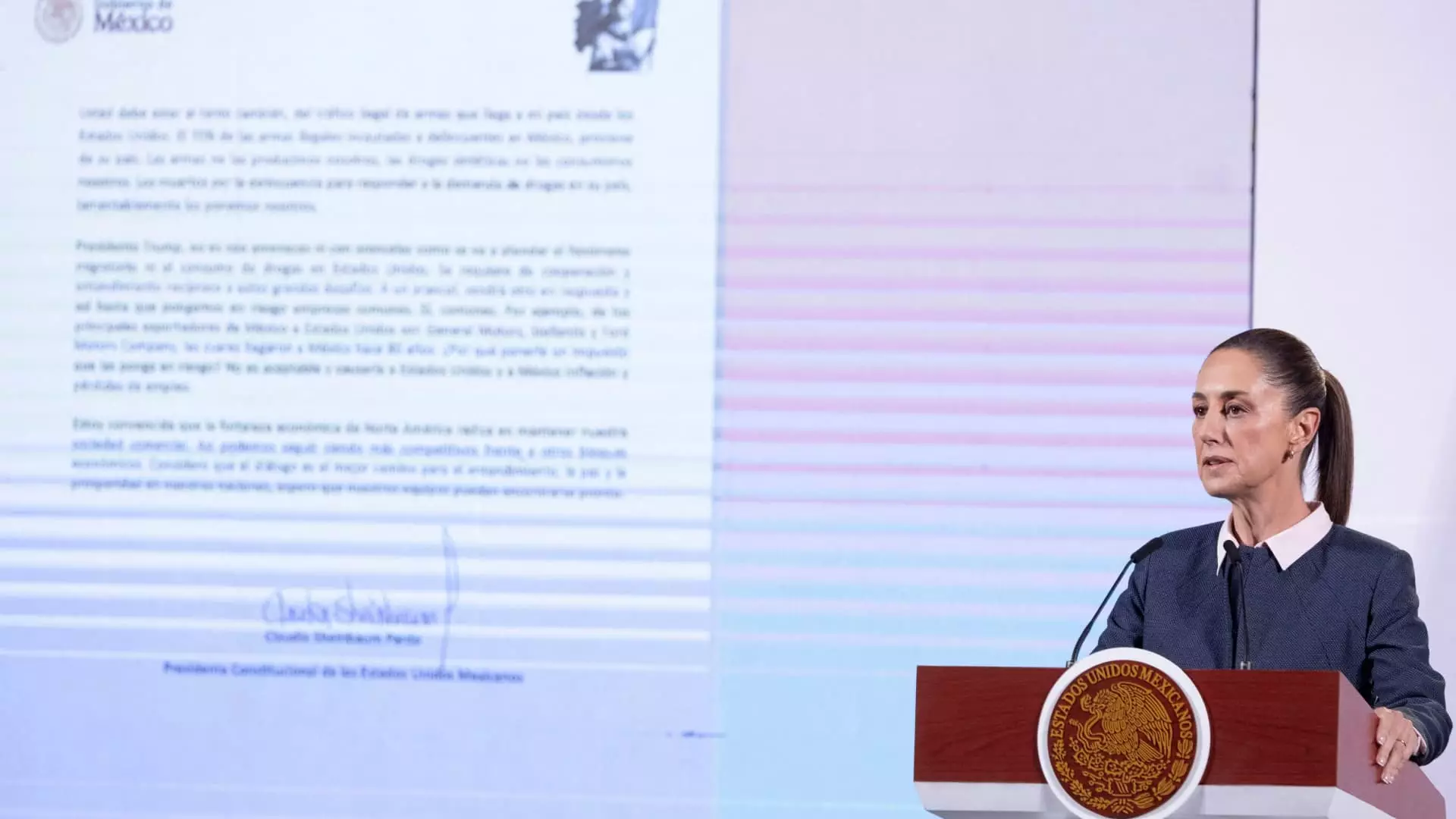The relationship between Mexico and the United States has always been interwoven with the threads of trade, economics, and politics. As the world’s largest economy and a close neighbor, the U.S. holds significant influence over Mexico’s economic landscape. A recent comment from Mexican President Claudia Sheinbaum has underscored the fragility of this relationship, following threats from U.S. President-elect Donald Trump regarding a proposed 25% tariff on Mexican goods. Such an action, according to Sheinbaum and her government, could lead to devastating consequences for both economies, emphasizing the interconnectedness of trade implications and job security on both sides of the border.
President Sheinbaum unequivocally stated that Mexico would retaliate if Trump proceeded with his tariff proposal. This assertion highlights a critical point: imposing such tariffs could not only harm U.S. jobs—potentially around 400,000, according to Mexican officials—but could also escalate into a trade war that would mutually disadvantage both nations. During a press conference, Economy Minister Marcelo Ebrard echoed these sentiments, stressing that tariffs would be detrimental, calling the move a “shot in the foot.” The focus on cooperation rather than conflict underscores a desire to maintain and build on the existing trade agreements, namely the United States-Mexico-Canada Agreement (USMCA).
The automotive industry, a vital part of Mexico’s economy, stands to be heavily affected by these proposed tariffs. Ebrard highlighted that 88% of pickup trucks sold in the U.S. are manufactured in Mexico. Should these tariffs be enacted, consumers could face an increase of approximately $3,000 on these vehicles, disproportionately affecting rural communities—many of whom supported Trump—where such vehicles are essential for daily life. The implications extend beyond pricing; Ebrard warned that the U.S. companies exporting to and producing in Mexico, like Ford and General Motors, would be compelled to absorb increased costs, squeezing their profit margins significantly.
Some analysts view Trump’s tariff threats as more of a bargaining tactic rather than a coherent trade policy, suggesting that the real aim is to exert pressure on Mexico and other nations regarding unrelated issues, such as immigration and narcotics. Trump himself stated that these tariffs would remain until the flow of drugs and migrants across the border is controlled. This context raises important questions about the effectiveness and implications of using economic policy as a tool for broader political negotiations. The murky intersections of trade, immigration, and crime create a complex framework in which both nations must navigate carefully.
The markets reacted to these unfolding events, with Mexico’s peso showing signs of strength against the dollar—an indicator of investor sentiment. Despite the uncertainty caused by tariff threats, investor reactions suggest some belief in the durability of Mexico-U.S. relations. However, trade experts warn of underlying risks. Barclays analysts have suggested that the proposed tariffs could obliterate profits for the major U.S. automakers, thereby leading to decreased investments and innovation in the sector.
Furthermore, the Institute of International Finance has cautioned that a move towards increased protectionism could destabilize the region’s economic equilibrium. As tariffs are weapons in economic conflict, the ripple effects could lead to higher prices and lower economic growth on both sides, exacerbating existing tensions.
The USMCA, up for review in 2026, presents an opportunity for potentially renegotiating the terms of trade between the three signatory countries. Katia Goya, director of international economics at Grupo Financiero Banorte, suggests that the potential for a conflict situation could incentivize a thorough reassessment rather than a simple renewal of the current terms. A comprehensive approach would be crucial to avoid scarring the economic landscape from possible tariff-induced damages.
The discourse surrounding Trump’s tariffs and the responses from Mexico’s leadership illuminate the delicate balance within U.S.-Mexico trade relations. As both countries stand to lose from a trade war, the focus must shift towards cooperation. By fostering a collaborative atmosphere, the chances of building a stronger economic partnership, one resilient to the blows of political maneuvering, can emerge. It is essential for leaders on both sides to prioritize economic stability and job security over nationalistic posturing, recognizing that the interconnected fates of their people hinge upon mutual respect and collaboration.


Leave a Reply